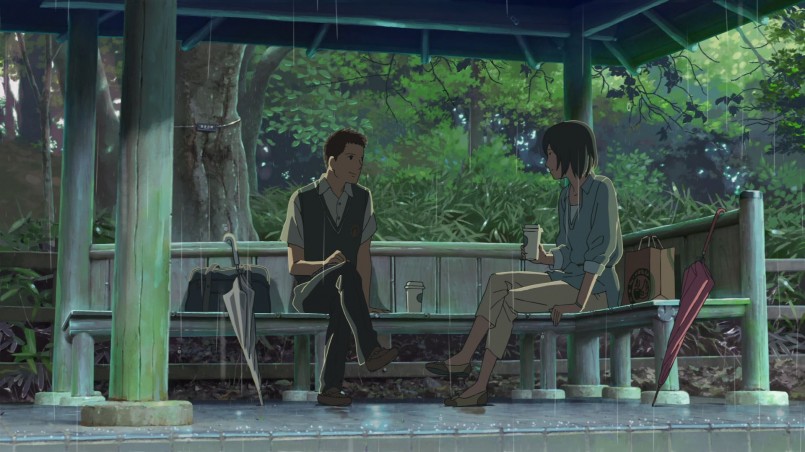Makoto Shinkai
 Shinkai’s films, while breathtakingly beautiful, are almost all intensely depressing and sad. He has been dubbed “the new Miyazaki” by many in the anime biz, but he considers that to be an exaggeration. His earlier films were sad and beautiful, but as such were not really comparable to the generally family fare that comes from Studio Ghibli. Children Who Chase Lost Voices however is easily comparable to even the most enchanting of Hayao Miyazaki’s works. Shinkai films are generally fine for family viewing, but are more slowly paced and lugubrious than your average family movies.
Shinkai’s films, while breathtakingly beautiful, are almost all intensely depressing and sad. He has been dubbed “the new Miyazaki” by many in the anime biz, but he considers that to be an exaggeration. His earlier films were sad and beautiful, but as such were not really comparable to the generally family fare that comes from Studio Ghibli. Children Who Chase Lost Voices however is easily comparable to even the most enchanting of Hayao Miyazaki’s works. Shinkai films are generally fine for family viewing, but are more slowly paced and lugubrious than your average family movies.
Click here to read about Shinkai’s OVA works too
The Place Promised in Our Early Days (2004)
Kumo no Mukō, Yakusoku no Basho (雲のむこう、約束の場所) (lit. “Beyond the Clouds, the Promised Place”)
Shinkaisan must have a very depressing love life, because this movie (like Shinkai’s OVA Voices of a Distant Star before it) portrays an almost absurdly challenged love. The love is so deep between the film’s protagonists that it transcends multiple literal dimensions. Unfortunately, even though it’s only an hour and a half, this movie feels longer, but with the superb animation and a love portrayed that quite literally knows no bounds, this film is pretty much guaranteed to not only be worth the ride, but touch you in the non-suggestive way that only such a profound story can. I definitely cried (and you probably will too) during the last few minutes of the movie. Positively beautiful and recommended most for watching with a significant other.
5 Centimeters Per Second (2007)
Byōsoku Go Senchimētoru (秒速5センチメートル)
Another in the line of Shinkai’s depressing masterpieces. This one is split into three unequally sized sections that depict the rather sordid love between a boy and a girl and how the distance and time between them affects their relationship. Don’t expect a happy movie full of dancing bunnies and butterfly kisses here at all, the sorrow portrayed throughout is palpable and feels very real. The first part made me cry a bit, but the entire piece taken as a whole is even more depressing. Very much worth the emotional ride for not only the excellent animation, but also the very deep kind of love that only Shinkai seems to be able to depict on screen. Not a movie for the clinically depressed, but a stunning piece for the anime buff and romance enthusiast alike.
Children Who Chase Lost Voices (2011)
Hoshi o Ou Kodomo (星を追う子ども) (lit. “Children Who Chase Stars”)
Departing from his stint of depressing movies, Shinkai takes a swing at the Ghibli-dominated genre of fantasy adventure movies in Children Who Chase Lost Voices (From Deep Below). Borrowing liberally in character design/animation and general concepts from such Miyazaki classics as Laputa: Castle in the Sky and Princess Mononoke, Children Who Chase Lost Voices ends up being much more than just the sum of its parts thanks to the expert writing and directing of Shinkaisan. The movie follows a young girl named Asuna who is living a standard life in small-town Japan after the death of her father as she discovers that there is a hidden world underground replete with fantastic creatures and a surprising history that may hold the key to resurrecting the dead. Watching this movie will give any anime fan a lot of flashbacks to the heyday of Studio Ghibli fantasy adventures, but this movie really is much more than just a Ghibli clone. Children Who Chase Lost Voices skews toward an older audience than other fantasy adventures dealing thematically with such subject matter as coping with loss and the purpose/inevitability of death while including the beautiful sweeping vistas and intricately detailed environments that Shinkai films are known for. Living up to his “new Miyazaki” nickname, Shinkai has shown that he is more than just a one-trick pony and that he can make an enthralling fantasy adventure just as easily as the more melancholy works for which he is renowned. Certainly the best fantasy adventure anime to come out in a long while, I cannot recommend Children Who Chase Lost Voices enough.
The Garden of Words (2013)
Kotonoha no Niwa (言の葉の庭)
A return to form for director Shinkai, The Garden of Words hearkens back to his earlier films and their focus on deep personal emotions as opposed to a grand sweeping narrative. At a mere 46 minutes, this is the shortest feature Shinkai has released since way back in 2002 with Voices from a Distant Star, but the extra time that allowed for the polishing of the script and jaw-dropping animation is evident in every scene. The Garden of Words follows a 15 year old high school student named Takao who blows off school whenever it rains to draw shoe designs in a park, where he meets a mysterious woman who also loves the rain. That may not seem like much of a plot, and it really isn’t considering how much of the movie’s short time is spent showing (admittedly gorgeous) artsy establishing shots, but Shinkai manages to make it acutely engaging throughout by taking the story in some interesting directions. Shinkai may be growing softer as he matures in his directorial role – The Garden of Words lacks the biting despair of many of his previous works, but if anything the movie is enhanced by having its focus shifted from hopelessness to a more contemplative melancholy. Covering themes that will resonate deeply with many people like feeling out of place in one’s vocation, having practical dreams for the future, enjoying the rain much more than stifling sunny days and being held from true happiness by both society and the pressures of modern subsistence, The Garden of Words is sure to feel much more personal than your average cinematic fare. A contender for the most beautiful animated film made to date, do yourself a big favour and check out The Garden of Words as soon as possible.




